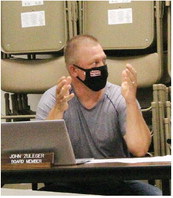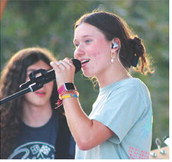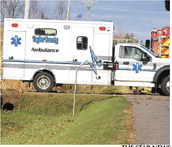Playing it safe


Medford School Board looks at process for dealing with sick kids, staff
If you are sick, stay home.
That was the message at Monday’s meeting of the Medford School Board as board members and the school nurses reviewed school opening plans.
The first day for students is scheduled for September 1 with in-person classes and the option for students to do coursework electronically. Under the state orders, masks will be required to be worn by students and staff.
Of enrolled students in the district the vast majority are choosing inschool instruction. As of the meeting, 1,698 students were enrolled for in-person and 126 were enrolled preferring virtual online instruction. A number of families remain undecided or have not completed the registration.
See SCHOOL BOARD on page 9 School board looks at opening issues, sports
Elementary principal Dan Miller said it is normal for people not be registered at this point in the year and that they are prepared to deal with any situations that may arise.
“We have a short window, we can’t do much about that,” Sullivan said, of the work done to prepare for the start of the school year.
Board president Dave Fleegel asked about the district’s readiness in dealing with the undecided and where they may end up. Miller said they will handle whatever comes, and that while the total number of undecided seems like a lot, it is spread over all grades, so that, it is not a lot at any one level.
The board reviewed the flow chart that will be used when students, or staff, are sent to the office showing symptoms. School nurse Mindy Schwarz explained that students sent to her office with normal bumps and bruises or to have medicines administered, would be kept separate from those sent who are displaying potential COVID-19 symptoms. She and nurse Shannon Wiegel walked board members through the screening process to determine if students would be sent home with the option of self-quarantining for 10 days or if they would be referred for COVID-19 testing which could potentially have them quarantined for 14 days.
Fleegel expressed concern that children could be led into agreeing to something without parents being involved. “A young child can be agreeable to whatever you ask them,” Fleegel said, noting the decision to go in for a test should be the parent’s to make.
Schwarz agreed and said the parents would be notifi ed and it would be their decision.
This raised the situation of what happens when a student is home, with Fleegel questioning if the student could switch to receiving virtual schooling while they are home.
“It can change overnight,” Sullivan said of the availability of a virtual option for students as they may be in school one day and home the next due to a quarantine situation. He said that in general they are asking for people to be committed to three weeks at a time for in person or virtual instruction. He said that if students are home they could potentially log in so that they are not missing instruction for that day. However, he cautioned that they are not creating a system where if people don’t want to come to school they wouldn’t have to. “You are either one or the other,” Sullivan said of the in person or online options.
A major concern for administration is how to handle if teachers get sick. Sullivan reported that Hayward School District currently has 27 teachers either sick or in quarantine and has had to reconfigure how they start the school year. He emphasized the need for district staff to take every precaution to avoid getting sick, this includes wearing masks.
“You will wear them and you will wear them correctly,” Sullivan said, noting that if they got 20 teachers out it would be a major issue, especially with a severe shortage of substitute teachers this year.
Board member Brian Hallgren said that his perspective was that if a teacher was not feeling well they had an obligation to checking out. Board member Dede Strama asked about teachers teaching from home if they were on quarantine but not ill.
Sullivan said they would leave the door open to that with the potential of having another school official who is not a teacher supervising the classroom.
“What are we doing with students that will not wear a mask?” asked board member Cheryl Wibben.
Sullivan explained that all students and staff will be expected to wear masks unless they have a doctors note saying they are unable to wear one due to a medical reason. He said students who do not have the medical excuse and refuse to wear a mask will be treated the same as someone wearing inappropriate clothes and not be allowed in the building. He said this would be treated the same as any student who violates school rules leading up to the potential for expulsion.
Board member Oralee Dittrich raised a concern she heard from a parent in another district about Aspirus providers not writing medical excuses for masks. Sullivan noted the district has already received notes from some Aspirus doctors and said if there is a legitimate reason the doctors are writing them.
Schwarz said the conditions where someone cannot safely wear a mask are narrow with most relating to mental health or trauma rather than breathing conditions.
In other business, board members:
_ Received an update from activities director Andy Guden about the start of the fall sports season and the potential changes that could occur this year with the WIAA allowing a fourth season between winter and spring as an alternative to a fall season. Guden said this was a possibility if something happened to stop the fall sports season from finishing.
This led to a discussion about access to games, Sullivan said that at this time they are not planning to limit access to outdoor games, noting there is ample seating for people to spread out and observe social distancing. Any indoor sports, spectators would have to wear masks and the district will be seating every other bleacher row in order to social distance. Sullivan said he did not anticipate limiting attendance at these games. “I wish we would get 1,000 people to show up for a volleyball game,” Sullivan said, noting he did not expect that many people to attend any game.
He said that conditions could warrant making changes as the season progresses and called on people to be understanding about it. “We are trying our best,” he said.
Board member John Zuleger raised concern about visiting spectators from other communities where they may have a large outbreak of COVID-19 and could potentially bring it here.
“That is a decision I will have to make,” Sullivan said, noting there may be games that are closed to fans or that a team may just not play that week.
_ Received an update from principal Jill Lybert about plans for homecoming. She said the goal was to keep it as similar as in the past with plans for a parade. If that is not possible she said they would look at doing something on the school campus. She noted that even if they are unable to have a dance, they still will have a king and queen with an assembly held outdoors at Raider Field. “We are still trying to do as much as normal as possible,” she said.
_ Approved switching providers for general liability, workers compensation, crime and cyber security to The Insurance Center of La Crosse. Agent Brian Hess from the company spoke to the board about The Insurance Center’s background and history. This is the first time in many years that the district sought bids for the insurance and The Insurance Center’s bid was about a $20,000 savings to the district. According to finance director Audra Brooks, it is standard to go out for bids about every three years for these insurance premiums.
_ Approved removing “academic dishonesty” as a specific example of the a level one violation in the co-curricular code of conduct. According to Guden the change was requested to allow greater flexibility in the classroom in dealing with situations. He gave the example of a student peeking over to see someone’s test as a low level offense that might not justify a level one violation. “We didn’t want to put ourselves into a corner,” he said, instead leaving it up to classroom teachers to react. He emphasized that despite removing it as an example, a student could still get a violation for it as being “out of character.”
“It doesn’t mean that someone who does cheat isn’t going to get a level one,” Guden said, noting it was intended to allow teachers to run their classes with more freedom.
Fleegel objected to removing the term from the code of conduct, he questioned the idea that someone only took a peek at another student’s paper as being somehow less dishonest.
Lybert said it presents a real challenge for the administration because it becomes a case of “he said, she said” in many of the situations. She said this is different than someone plagiarizing an essay or having a pattern of cheating.
“It is out of character behaviors and those are just examples, not limits,” Wibben said.
The change was approved on an 8-1 vote with Fleegel opposed.

Continued from page 1



